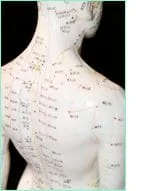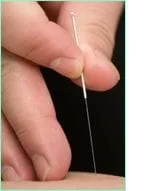
Acupuncture is a medical treatment of activating our body’s healing system,
and unleashing our natural healing power. This is done by inserting fine
needles at precise acupuncture points and leaving them in for 20-30 minutes.
What is Medical Acupuncture?
Medical acupuncture is performed by a medical doctor who is trained in both
Western and Eastern Medicine. By integrating Western and Eastern Medicine,
we can provide the most comprehensive medical approach to our patients.
Why should I consider acupuncture?
While practicing Western medicine, we have found that it has many
limitations. Although acupuncture has its own limitations, it is very
effective for many illnesses and conditions, especially those that
conventional medicine has failed. For many difficult medical conditions,
acupuncture treatment heals and cures, while pills and injections cover up
the symptoms.
How does acupuncture work?
The classical Chinese explanation is that channels of energy run in regular
patterns throughout the body and over its surface. These energy channels,
called meridians, are live rivers flowing through the body to irrigate and
nourish the body’s tissues. An obstruction in the movement of these energy
rivers is like a dam that backs up the flow in one part of the body and
restricts the flow in other parts.
The acupuncture needles unblock the obstructions at the dams and reestablish the regular flow through the meridians. Acupuncture treatments can therefore help the body repair and regenerate tissue, correct an overactive immune system, relieve pain and inflammation, and balance the body’s functions.
The exact mechanism of acupuncture has not been explained by modern science. In modern scientific approach, acupuncture activates our own anti-inflammatory response and our body reduces or eliminates inflammation, especially chronic inflammation. This process leads our body to self-healing for both physical and emotional wellbeing. We believe the meridian systems reside in our connective tissue and are independent from our nervous and hormonal systems.
How many treatments will I need?
The number of treatments needed differs from person to person. For most
conditions, three to five treatments scheduled one week apart are
sufficient. Some patients may need a few booster treatments.

Acupuncture needles are very thin and solid and are made from stainless
steel. The point is smooth (not hollow with cutting edges like a hypodermic
needle) and insertion through the skin is not painful like an injection or
blood sampling can be. Most patients feel only a mild sensation as the
needles are inserted. Some patients do not even feel the needles.
Sometimes, mild bruising can occur, but this is generally not a problem. We use sterile, disposable needles which never cause infection, even around artificial joints.
Are there any side effects with acupuncture?
Usually not. As energy is redirected in the body, the healing process
begins to resume. Occasionally, the original symptoms may worsen for a day
or so. Other general changes in appetite, sleep, bowel, urination, or
emotional patterns may be triggered. These should not cause concern, as
they are simply indications that the acupuncture is starting to work and
these symptoms will subside within a couple of days.
It is quite common, especially with the first or second treatments, to have a sensation of deep relaxation immediately following the treatment. This is a very pleasant and beneficial side effect of acupuncture treatment.
What activity is allowed after treatment?
Immediately after treatment it is recommended that strenuous activities be
avoided, but you may resume usual daily activities. Drinking plenty of
fluids before and after treatments is always beneficial.
Does acupuncture really work?
Yes! For over 4000 years, acupuncture has been practiced in Asia very
successfully. Today, acupuncture is practiced all over the world and is
being used more and more in the United States by physicians.
Acupuncture treatments can be given at the same time other treatments are being used, such as conventional Western medicine, chiropractic adjustments, physical therapy, and massage therapy. It is important that your physician acupuncturist know everything that you are doing so that he or she can help you get the most benefit from all of your treatments.
There has been skepticism of acupuncture, especially among medical professionals. Many medical professionals believe that acupuncture is a mere placebo effect. But acupuncture has successfully healed babies, animals, and even plants.
- Arthritis
- Neck pain
- Shoulder pain
- Knee pain
- Hip pain
- Tennis elbow
- Plantar fasciitis
- (heel spur)
- Sciatica
- Allergies – food and environmental
- Sinus problems
- Hayfever
- Asthma
- Hives
- Bell’s palsy
- Facial spasm
- Meniere’s disease
- Dizziness
- Post-concussion
- Irritable bowel syndrome
- Fibromyalgia
- Chronic fatigue syndrome
- Diarrhea
- Macular degeneration
- Stroke
- Peripheral neuropathy
- Shingles pain
- Trigeminal neuralgia
- Autoimmune disease
- Multiple sclerosis
- Rheumatoid arthritis
- Celiac disease
- Lupus
- Sarcoidosis
- Psoriasis
- Anxiety
- Depression
- Insomnia
- ADHD
- Autism
- Asperger’s syndrome
- Infertility
- Endometriosis
- Menstrual Cramps
- Recurrent miscarriage
- Morning sickness
- Infantile colic
- Menopause symptoms
- Athletic injuries
- Face lift
- Smoking cessation